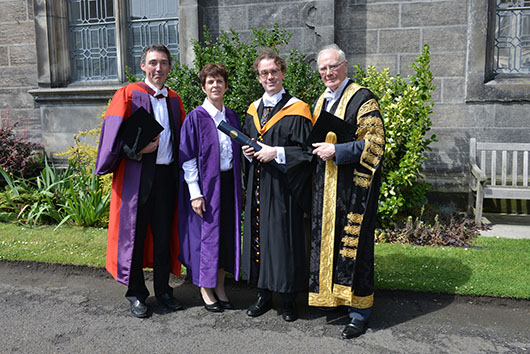Laureation address – Sir Jonathan Edward Harland Mills
Sir Jonathan Edward Harland Mills
Honorary Degree of Doctor of Letters
Laureation by Professor Will Fowler
School of Modern Languages

Chancellor, it is my privilege to present Sir Jonathan Edward Harland Mills for the Degree of Doctor of Letters, honoris causa.
Before us we have, first and foremost, a great composer. But he is also a man of many and extraordinary talents. In addition to composing two truly mesmerising operas, an oratorio, and a ballet within an opus that has included song cycles, concertos, octets and string quartets, Jonathan Mills has proven himself to be an impressive impresario and an arts festival director par excellence. Distinguished mentor of future generations of festival directors, generous visiting professor at a number of prestigious universities, regular prize-jury member as well as an internationally recognised prize winner in his own right, he is, undoubtedly, a veritable visionary and an uncompromising champion of the authentic in music and the arts.
Jonathan Mills was born in Sydney in 1963 and grew up in New South Wales, Australia, obtaining his Bachelor of Music in Composition from the University of Sydney in 1984. A modern day Renaissance man of boundless energy and tremendous stamina he thereafter went on to study for a Master of Architecture in acoustic design, whilst he held a number of staggeringly demanding jobs at the same time. Between 1988 and 2003 he was the artistic director of a remarkable plethora of music festivals held in Sydney, Brisbane and Melbourne, whilst writing music as composer-in-residence at the Royal Melbourne Institute of Technology where he also found time to lecture as adjunct professor. It was during these years that he composed a song cycle for radio from poems by Martin Harrison – Four First Songs – and the ballet based on the lives and ideas of the architects who designed and built Canberra as the new capital of Australia in 1909, The Ethereal Eye, that was to establish Jonathan Mills firmly as one of the most original and exciting composers of the turn of the century.
It was in 1999 that Mills, working alongside librettist Dorothy Porter, composed his first chamber opera, The Ghost Wife, based on a short story by Barbara Baynton set in the Australian bush at the beginning of the twentieth century. Compared to Benjamin Britten and Michael Tippet by the Guardian critic Andrew Clements, Mills’ elaborate yet sparse music became acclaimed for its atmospheric quality; a score that was eloquent, densely dramatic, powerful, compelling, engagingly intense.
In 2001 he went on to complete his oratorio for tenor, choir, and orchestra: Sandakan Threnody. Here his score is truly evocative, haunting, at times profoundly disturbing, at others breathtakingly moving, as would be expected in a threnos, a song of lamentation that is part of a public act of grief. Juxtaposing chaos with calm, with grand purpose and extraordinary beauty, Jonathan Mills’ music captures the feelings of loss and tragedy in an oratorio that tackles the horrendous real-life story of the 2,345 Australian and British prisoners of war who, having been incarcerated in the Japanese camp in Sandakan, Borneo, where Mills’ own father spent some time as a prisoner, were sent on a death march by Japanese Captain Soichi Yamamoto towards Ranau in 1945. It was a journey only six would survive. The oratorio, revised and premiered as part of Sydney Symphony’s 2004 “Meet the Music” series at the Concert Hall Sydney Opera House, was to be subsequently performed in the Singapore, Brisbane and Melbourne Festivals, receiving the very distinguished 2005 Prix Italia.
Sandakan Threnody was to be followed by his 2003 chamber opera The Eternity Man, commissioned as a Genesis Foundation Prize by Almeida/Aldeburgh Opera and premiered in London in July that year. He would return to it and revise it in 2007, with it being filmed as an opera for television by Channel 4 and Australia’s ABC TV and broadcast in 2008 and 2009. Unsurprisingly The Eternity Man picked up a stream of awards, including the ATOM Australia award, the Queensland Cinematography Judges Prize and the Swiss Rose d’Or. Tracing the true story of a shell-shocked alcoholic First World War veteran who spent forty years wandering the streets of Sydney writing the word “Eternity” on the pavements with chalk, having undergone a religious epiphany, Sir Jonathan’s music was again haunting, provocative, melancholic, challengingly atonal, dark yet exhilarating.
I am told that he is currently working on a new opera based on Murray Bail’s novel Eucalyptus. As I said to begin with, Chancellor, before us we have, first and foremost, a great composer. But Jonathan Mills is also a man of many and extraordinary talents. Having been the Artistic Director of the Melbourne International Arts Festival, the Melbourne Federation Festival, the Melbourne Millennium Eve Celebrations, and the Brisbane Biennial International Music Festival, he has been, since 2007, the inspired and inspiring Director of the Edinburgh International Festival responsible for extending the international reach and contemporary relevance of the festival. Thanks to Mills, the Edinburgh International Festival, which was characteristically a European event, has become genuinely international, especially in the way that it has enthusiastically embraced the cultures of Asia as a reflection of recent geopolitical trends. His talent, hard work, and visionary brilliance, duly recognised this year in the Queen’s birthday honours with a knighthood for services to culture, have brought the joy of experiencing art in its many and varied forms to countless thousands of people from all over the world.
Chancellor, in recognition of his major contribution to culture, music and the arts, I invite you to confer on Sir Jonathan Mills the Degree of Doctor of Letters, honoris causa.
Category Awards